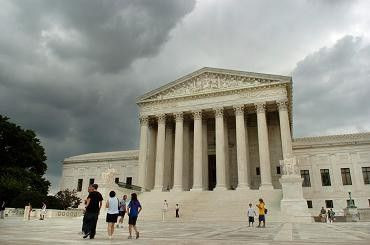Supreme Court Voices Concern About GPS Tracking by Police

U.S. Supreme Court Justices Tuesday grilled an Obama administration attorney about law enforcement's warrantless use of GPS tracking of a drug trafficking suspect's car in a case that could allow such monitoring without court approval.
The case has been closely watched because of the impact a decision would have on civil liberties. There are concerns that the Supreme Court could decide that law enforcement are free to use GPS technology to track people in public without a warrant and compile the data.
Michael R. Dreeben, the administration's attorney, said that placing GPS trackers on vehicles traveling on public roads was not a search under the Fourth Amendment.
In the case before the justices, the FBI, without a warrant, installed a GPS device in the car of Antoine Jones, a Washington, D.C., night club owner suspected of drug trafficking. The GPS data used at his trial resulted in a conviction and a sentenced of life in prison.
A lower appellate court, however, overturned the conviction because the FBI tracked his vehicle for a month. Though he was on public streets, the appeals court ruled that Jones had a reasonable expectation of privacy in that no one person could track his vehicle for a month.
Chief Justice John G. Roberts asked Dreeben if he believed that Dreeben's theory of GPS data and searches would allow federal law enforcement to use tracking technology on the justices' vehicles.
Under our theory and under this court's cases, the justices of this court when driving on public roadways have no greater expectation... Dreeban said.
So your answer is yes, you could tomorrow decide that you put a GPS device on every one of our cars, follow us for a month, no problem under the Constitution, Roberts said.
Justice Samuel Alito, who said that he disagreed with the court establishing a reasonable expectation of privacy as a bench mark for unlawful searches, wondered about the increasing sophistication of technology at the hands of law enforcement.
So how do we deal with this? Do we just say, well, nothing is changed, so that all the information that people expose to the public is fair game? Alito said. There is no search or seizure when that is obtained, because there isn't a reasonable expectation of privacy?
Justice Stephen Breyer said he shared concerns that a ruling in favor of the government would mean that the public movement of U.S. citizens could be monitored 24 hours a day.
If you win, you suddenly produce what sounds like '1984,' Breyer said.
The justices also grilled Jones' attorney, Stephen Leckar, with scenarios in which law enforcement can track suspects without GPS data but get the simiar information. Justice Elena Kagan asked how GPS tracking of a suspect is different from the cameras in London that allow police piece together a person's movements.
Alito asked Leckar to explain the difference between using GPS to track a suspect for 12 hours or having the police do the monitoring themselves.
Leckar responded that use of GPS is an unreasonable invasion of privacy because the human element would be taken out of the surveillance factor.
© Copyright IBTimes 2024. All rights reserved.





















